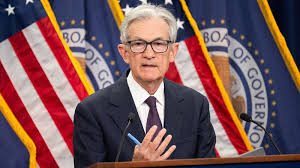Federal Reserve Chair Jerome Powell reiterated the central bank's commitment to managing inflation during his recent address to congressional committees. Powell emphasized that the Federal Reserve will continue to closely monitor the impacts of tariffs on prices before making any policy adjustments. While he acknowledged strong economic growth and near-full employment in the labor market, Powell stressed that inflation still exceeds the Fed's 2% target, highlighting the uncertainty surrounding the effects of tariffs, particularly those imposed by President Trump.
In his address, Powell underscored the importance of gathering more data on the evolving policy changes before considering any modifications to the current policy stance. This cautious approach outlined by Powell is likely to further fuel tensions with President Trump, who has openly criticized the Fed chief for his decisions. Trump, in a recent post on his social media platform, criticized Powell, characterizing him as "dumb" and "hardheaded."
Powell presented the Fed's monetary policy report to the House Financial Services Committee and the Senate Banking Committee, reiterating his confidence in the economy's strength and labor market conditions. He noted that inflation, as measured by the Fed's preferred indices, is expected to rise, but emphasized that the Fed will maintain its focus on anchoring longer-term inflation expectations and preventing temporary price upticks from morphing into sustained inflationary pressures.
Although the Federal Open Market Committee cFOMCc unanimously voted to hold rates steady, the "dot plot" grid revealed disparities among its members regarding future rate cuts. While some members favored maintaining rates, others leaned towards one, two, or even three cuts. Notably, Governors Michelle Bowman and Christopher Waller expressed openness to a rate reduction if inflation remains subdued. Market indicators show a relatively low likelihood of a rate cut at the upcoming meeting, with September emerging as a more probable timeline for adjustment.
Powell's remarks underscore the Fed's commitment to maintaining price stability while balancing the dual goals of full employment and low inflation. The central bank's cautious approach reflects a broader strategy of gathering sufficient data and assessing the impacts of tariffs to make informed policy decisions. As economic uncertainties persist, the Fed remains vigilant in its efforts to steer the economy towards stable growth and sustained labor market conditions.
In conclusion, Jerome Powell's recent comments shed light on the Fed's stance on inflation, tariffs, and monetary policy. By emphasizing the need for patience and data-driven decisions, Powell's remarks underscore the Federal Reserve's commitment to navigating evolving economic conditions while prioritizing long-term stability. As policymakers continue to monitor inflation pressures and external factors like tariffs, the Fed remains poised to adjust its policy stance as needed to support the economy's overall health and resilience.

